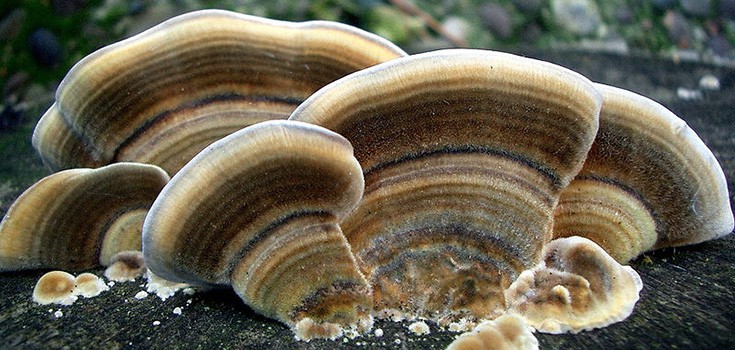The Mushroom Being Used to Suppress Cancer Tumors

Have you heard of the mushroom being used to boost the immune system and fight cancer? While there are countless foods and compounds out there being researched for their cancer-fighting abilities, the turkey tail mushroom is one food that has gained some spotlight as of recent. Specifically, the mushroom has been shown to be highly effective at suppressing prostate tumor development.
The research, coming from the Queensland University of Technology (QUT), focuses on a compound known as polysaccharopeptide (PSP), which is found in the turkey tail mushroom. For the study, two groups of mice were used, one of which was fed PSP for 20 weeks. What Dr. ling found was that mice fed the PSP over the 20 weeks did not develop any prostate tumors, whereas the group of mice not fed PSP did develop tumors.
Dr Ling, from the Australian Prostate Cancer Research Centre-Queensland and Institute for Biomedical Health & Innovation at QUT had this to say:
“The findings are quite significant. What we wanted to demonstrate was whether that compound could stop the development of prostate tumours in the first place. In the past, other inhibitors tested in research trials have been shown to be up to 70 per cent effective, but we’re seeing 100 per cent of this tumour prevented from developing with PSP. Importantly, we did not see any side effects from the treatment.”
While Lings research shows the potential for polysaccharopeptide to completely inhibit prostate tumor formation, he does note that his research doesn’t suggest that simply eating the mushrooms would have the same benefit.
Turkey Tail Mushroom and Breast Cancer
Of course the research doesn’t end there with the turkey tail mushroom. More recently, the mushroom was used by a cancer patient from Bastyr University. The breast cancer patient, Lisa Clinton, is just one of many individuals around the world who wholeheartedly believe that natural foods played a large role in her survival. After going through surgery, the ice skating competitor refused the extremely questionable cancer-treatment chemotherapy and turned to turkey tail instead to target her cancer.
“We consider cancer a failure of the immune system…When they [turkey tail] are ingested into the body, they stimulate immune cells that line the intestines, and then those stimulate other immune cells all over the body,” says Dr. Leanna Standish at Bastyr University.
If you’re looking to buy the turkey tail mushroom, take these tips into consideration:
- Buy certified organic.
- Look for turkey tail coming from skilled growers with skills in cultivation.
Be sure to check out some other cancer-fighting foods to broaden your cancer-prevention horizon.

Thank you!
Please harvest consciously. Only take what you need. That goes to individuals and groups!! Please!
After listening to Stamets I had gotten some Reishi and Lions Mane mushrooms for my neuropathy and it seems to help.
Paul Stamets – How Mushrooms Can Save Bees & Our Food Supply | Bioneers
https://www.youtube.com/watch?v=DAw_Zzge49c#t=1556
Paul Stamets on Medicinal Mushrooms and Cancer
https://www.youtube.com/watch?v=hoJ2TgNdFh8
Turkey tail is just one of many medicinal mushrooms with anti-cancerous effects. I use several different varieties for my own treatments. There are at least 2 vendors online that sell organic medicinal mushrooms in bulk. I buy the powder and encapsulate it myself (I use the Cap ‘M Quik, which is superior to the Capsule Connection encapsulator, IMO). It makes supplementation much less expensive than if you were to buy the already-encapsulated mushrooms. Some mushrooms extract more of their medicine into alcohol so tinctures are also available.
It’s important to use mushrooms in conjunction with other things; never rely on one treatment alone to control or cure cancer. There is no magic pill or silver bullet for cancer since it’s such a multifaceted disease. All the causes need addressed, and those can be great in number and variety. The categories which can be dealt with by the individual are toxins, deficiencies, and pathogens–and to some extent hormone imbalances. Hereditary or genetic defects will likely be out of one’s control, but then again nothing is impossible, I suppose.